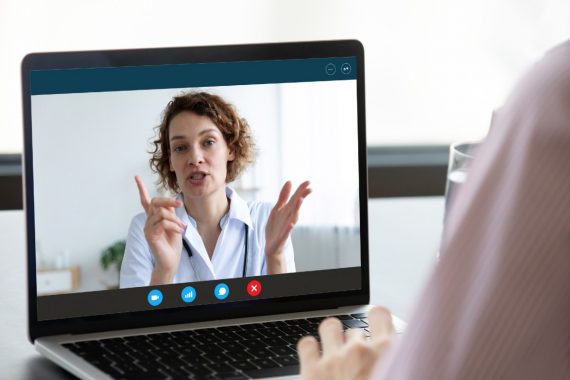Remote GP consultations can be as effective as face-to-face appointments when it comes to some conditions, including mental illness, alcohol misuse, weight management and stop smoking advice, say researchers.
A systematic review of 30 studies of more than 5 million participants suggested that virtual care seems to be just as good for some clinical outcomes such as depression and anxiety scores, and may be an effective substitute for in-person visits.
But there was some evidence that virtual consultations may increase the need for additional GP visits compared with face-to-face appointments, the National Institute for Health Research-funded study found.
Some evidence suggests that virtual consultations may also reduce waiting times, lower patient costs and reduce rates of follow-up for secondary and tertiary care, they reported.
But there is little evidence on the impact on clinical safety and this needs to be addressed, the Imperial College London team wrote in the Journal of Medical Internet Research.
The study also found that there was mixed evidence about equity when it came to remote consultations, with younger and female patients more likely to access care this way.
It highlights the need for local data and investigation on how best to tailor care to different communities or populations, they concluded. The studies included in the analysis were mainly done in the US, but also included research from the UK, Canada, Sweden, New Zealand, Singapore, Japan and Kenya.
While video and phone appointments were already becoming more widely used before the pandemic, in the UK and overseas, concerns had been raised about confidentiality, data security, the accuracy of diagnosis, patient safety and the potential to widen inequalities, the researchers noted.
Covid-19 then led to a rapid expansion in the use of virtual rather than in-person GP consultations – to around 70% of the total in the UK and 65% in the US, they said.
NHS Digital figures showed there were more than 29 million appointments in June 2023, 20 million of which were face to face.
Virtual consultations were seen as more convenient, but at the same time patients seen remotely felt less well supported in making informed choices autonomously, the results showed.
Study lead Dr Ana Luisa Neves, from the School of Public Health at Imperial College London, said: ‘Covid-19 caused a huge and rapid expansion in the use of virtual consultations in primary care. As part of an emergency response, it wasn’t possible to properly consider the impacts at the time.
‘Now, it is really important that we better understand what this immense change means, especially for patient outcomes, safety and equity.’
She added: ‘Based on the evidence we analysed, it seems that remote care is equally beneficial on health outcomes for certain conditions including mental health, alcohol misuse and smoking cessation.
‘For these conditions, evidence shows patients can get the same effectiveness of care as they would in face-to-face appointments.’
Now researchers need to look in more detail about whether the shift towards remote GP care might increase safety risks for some conditions and for certain patient subgroups, such as those with lower literacy and lower access to technology, she said.
Pulse October survey
Take our April 2025 survey to potentially win £200 worth of tokens













